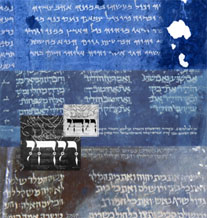
Le EAJS Lab est un événement scientifique (conférences et workshop) qui traite de la transmission matérielle de la Bible hébraïque de l’Antiquité au Moyen Âge.
Les intervenants réunis lors du colloque du mois de juin 2016, étudierons l’ensemble des méthodes de recherche employées dans les trois champs suivants : les manuscrits de la Mer Morte (DSS), de la Genizah du Caire (GC) et de la Genizah Européenne (EG).
Bien que ces sources soient de différentes périodes, espaces et milieux culturels, elles constituent les seules sources primaires dont nous disposons pour étudier la transmission de la Bible hébraïque. En dépit du fait que les DSS, GC et EG aient une thématique commune sur la transmission de la Bible hébraïque, les approches sont différentes. Alors que les DSS se focalisent plutôt sur la linguistique et la littérature, l’étude des Bibles hébraïques médiévales (CG et EG) se concentre sur la philologie, la paléographie et la codicologie.
La possibilité de consulter les manuscrits en ligne, le développement de base de données et d’autres nouveaux outils ont un impact croissant sur les pratiques de recherche. En invitant des spécialistes de la Bible hébraïque - doctorants, jeunes chercheurs et chercheurs confirmés - cet événement transdisciplinaire encouragera les participants à partager leurs méthodes et perspectives dans le but de soutenir de futures collaborations scientifiques.
L’événement se focalisera sur les questions suivantes :
– Quelles sont les approches d’étude des manuscrits bibliques hébreux ?
– Quelles sont les limites de ces approches ? - comment ces approches sont appliquées et mises en œuvre dans les DSS, CG et EG ?
– Comment les chercheurs de ces trois domaines pourraient bénéficier de pratiques communes et collaboratives ?
– Les outils numériques peuvent-ils rendre l’étude des sources plus rigoureuses ?
– Comment est-ce que les outils de recherche pourraient-ils être améliorés et répondre à la question de la transmission matérielle ?
Il y aura trois sessions dédiées chacune à un champs de recherche, introduite par une conférence magistrale. Une quatrième session présentera les projets de recherche actuels et futurs. Le dernier jour sera consacré à des séances de travail en groupe.
Contact organisation du colloque
Comité organisateur
– Élodie Attia, coordinatrice du projet, Centre Paul-Albert Février (CNRS - AMU)
– Samuel Blapp, doctorant, University of Cambridge, Fames
– Antony Perrot, doctorant EPHE, Sorbonne, Paris
Pour les contacter :
eajslab2016@gmail.com

De gauche à droite : Élodie Attia, Samuel Blapp et Antony Perrot
LIEU DU COLLOQUE
À la Maison méditerranéenne des sciences de l’homme, Aix-en-Provence, France.
Du lundi 6 au mercredi 8 juin 2016.
Langue du colloque : anglais
Événement scientifique international financé par l’Association européenne des études Juives (EAJS) et la fondation EVZ - Berlin, en partenariat avec le Centre Paul-Albert Février, organisé par Élodie Attia, Samuel Blapp, et Antony Perrot.
– Consultez le programme sur le site dédié à l’événement
*************************************
This workshop will focus on the material transmission of the Hebrew Bible from Antiquity to the Middle Ages.
We will examine a range of research methods used in the three main fields of Hebrew Bible manuscript studies : Dead Sea Scroll, Cairo Genizah and European Genizot studies. Although Dead Sea Scroll (DSS), Cairo Genizah (CG) and European Genizot (EG) manuscripts date from different eras and come from a diversity of geographical and cultural backgrounds, they all constitute the only primary sources we have for the study of the transmission of the Hebrew Bible. As such, they provide various fields of research with important information about their background.
Although DSS, CG and EG studies share a common concern with the transmission of the Hebrew Bible, their research approaches differ. Whereas studies on the DSS focus mainly on linguistics and literature, the study of Medieval Hebrew Bible manuscripts (CG and EG studies) concentrates on philology, palaeography and codicology. The online availability of digitised manuscripts, the development of databases and other new research tools are also having an increasing impact on research practices.
Bringing together PhD students, early career researchers and established scholars working on Hebrew Bible manuscripts, this transdisciplinary event will encourage participants to share their research methods and approaches, in order to foster and encourage future transdisciplinary research collaborations between them.
In order to provide a focus for discussion this workshop will address the following questions :
– What are the approaches to the study of Hebrew Bible manuscripts (e.g. language, palaeography) ?
– What are the limits of these approaches (i.e. how much do they tell us) ?
– How are these approaches applied in DSS, CG and EG studies (e.g. are palaeographical approaches the same in all three fields) ?
– How can researchers in these three fields benefit from each others’ research practices ?
– Can digital tools make Hebrew Bible studies more rigorous ?
– What research tools are still needed to improve the study of the material transmission of the Hebrew Bible ?
There will be three sessions, each focused on a specific field of research : Dead Sea Scrolls, the Cairo Genizah and the European Genizah. Each session will be introduced by a keynote lecture. Short presentations (10-15 min) by the participants will follow. All participants will be asked to send a first draft of their paper one month prior to the event in order to give the other participants time to prepare for an extended discussion.
Language of conference : English
LOCATION
EAJS Lab, 6th to 8th June 2016, Maison méditerranéenne des sciences de l’homme, Aix-en-Provence (France).
International scientific conference funded by the European Association for Jewish Studies ( EAJS ) and the Foundation EVZ - Berlin, in partnership with the Centre Paul-Albert Février, organized by Elodie Attia, Samuel Blapp and Antony Perrot.
The organizers
– Élodie Attia, Main organizer, Centre Paul-Albert Février (CNRS - AMU)
– Samuel Blapp, PHD Student, University of Cambridge, Fames
– Antony Perrot, PHD Student, EPHE, Sorbonne, Paris
To contact :
eajslab2016@gmail.com


